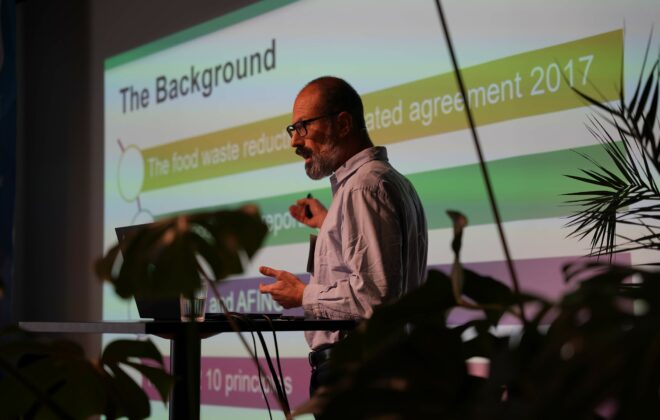The last AFINO Research School: Research and policy around RRI – the need for an ongoing dialogue
Looking at tensions between RRI research and policy with the RCN
The last AFINO PhD autumn school took place in October 2024, in Jondal (Norway). We dedicated the whole school to a theme which had been a red thread throughout all the AFINO years, namely: ‘Research and policy around RRI: tensions and opportunities’.

The autumn school gathered a small group of (early career) researchers from diverse fields (biotechnology and engineering backgrounds, as well as social and human sciences), to engage in discussions about the challenges and opportunities for partnerships at the interface between research and policy for RRI (Responsible Research and Innovation).
The discussions were facilitated by a varied teaching team, who brought forth their own experienced tensions, opportunities, and also intentions for RRI in their own settings: the Research Council of Norway (RCN, through special advisor Cecilie Anita Mathiesen), AFINO (with centre leader Siri Granum Carson, coordinator Giovanni De Grandis and WP3 leader Anne Blanchard), and DLN (with RRI-team Roger Strand and Anamika Chatterjee).

What is worth noticing is that for this last AFINO autumn school, we had the direct perspective of the RCN through Cecilie Mathiesen, and that allowed us to very practically explore our different understandings of responsibility in general, and RRI in particular, our different intentions and expectations for RRI, and how these sometimes lead to tensions between policy expectations and the practical realities of applying RRI in research projects.
A key tension: the conflicted journey of early career researchers
Over the course of the four days, one main tension that was discussed was the challenges experienced by early career researchers in putting RRI into practice in their own projects. We looked at the complexities of putting RRI into practice; which demands, as some participants noted, a reflexive step on the project’s objectives and how they (might) impact society at large, and time to set up meaningful participatory and inclusive processes; and the short-term, goal-oriented, excellence-driven institutions we are embedded in.
More specifically, some of the tensions we mapped were (i) the tensions inherent to the impossibility of meaningfully evaluate RRI efforts right at the end of a project, (ii) the different roles and sometimes conflicting ‘moralities’ that emerge at the individual, project and societal levels, (iii) the intentions for global justice, attention to local communities and dismissed voices, within institutions that are led by norms of efficiency, productivity, speed, and are highly hierarchical.
These discussions not only allowed participants to share the challenges they meet, but these tensions were starting points for reflecting on the needed collaborations and support between research and policy environments.


A walk shop through Jondal’s fantastic landscape was a part of the schedule at the Research School. It was enjoyed also by the teaching team, here partly represented by Giovanni De Grandis (NTNU/AFINO), Anne Blanchard (UiB/AFINO) and Anamika Chatterjee (NTNU/Digital Life Norway).
Nurturing dialogue and learning arenas on RRI research and policy
Throughout the autumn school, we looked at the (new) collaborations and partnerships required to bridge research and policy around RRI. We talked about the importance of keeping an open dialogue between actors in the research and innovation system and funding and policy organisations. We identified key areas where policy frameworks and RRI practices often diverge, including definitions or framings of responsibility, temporalities, and the evaluation of what constitutes ‘successful’ RRI in practice.


The participants in Jondal displaying their research school presentations. Left photo, from left; Feng Li (Doscon), Anura Arembage (Doscon), Natalia Murashova (Østfold University College) and Chloé Dhaille (Université Paris-Saclay CEARC). Right photo, from left; Jun Chen (NTNU), Sigfrid Kjeldaas (NORCE) and Kuluk Helms (Université Paris-Saclay CEARC).
The last AFINO autumn school provided a space for reflection and creative work (the reflections of the two groups of participants will be displayed in the RRI garden).
Our discussions on the tensions between RRI research and policy need to continue, not just within academic circles, but also in dialogue with the RCN; with a willingness to engage with both the challenges and opportunities.
Over the next few years, through the newly RCN-funded project ARINA (Responsible Radical Innovation: Network and learning arena) we will build on the experience and foundations laid by AFINO to support learning and dialogue on RRI across research and policy.



All photos are taken by the organisers.

Anne Blanchard
Anne Blanchard is a researcher at the Centre for the Study of the Sciences and the Humanities at the University of Bergen, where she is working on projects studying how science is employed for complex and uncertain climate and health challenges.
She is also the leader of The AFINO Research School. Read more about Anne at AFINO's webpage.




